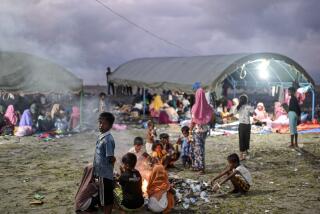Bleakness for the Boat People
- Share via
For the boat people fleeing Vietnam, this has always been the best time of the year to travel. The typhoon season is still a month away, and the strong southwesterly winds on the South China Sea push the old fishing boats along at a fast clip, saving fuel. With any luck, it can take less than a week to reach Hong Kong--for nearly a decade a favorite destination of Vietnamese refugees.
This year the winds are as favorable as ever, but the welcome is not. Last month the Hong Kong government began classifying all newly arrived boat people as illegal aliens. Instead of housing them in refugee camps where they could be processed for resettlement in the United States and other third countries, Hong Kong said that it would lock up boat people in prison-like detention centers and eventually repatriate them to Vietnam. Only those who could prove that they left Vietnam because of political persecution, perhaps 10% of the total, would be considered refugees eligible for resettlement in the West. As a Hong Kong official explained, the new policy is designed to send a message to the Vietnamese: “Do not come here.”
Hong Kong became more restrictive because it felt pushed to the limit. Early this year Vietnam’s collapsing economy and desperate rice shortages spurred more people to set to sea; at the same time, the process of resettling such refugees in the West slowed to a trickle. By mid-June Hong Kong housed more than 16,000 in its refugee camps--twice the number as last year and almost the same as in 1980, when the exodus from Vietnam was at its peak. More discouraging, however, was the growing reluctance of Western nations to offer permanent homes to the newest refugees. In 1987, for example, the United States granted asylum to 31,000 Indochinese refugees--only 300 of them from the Hong Kong camps. Refugee experts have a name for this phenomenon-- compassion fatigue.
American officials reject most of the newest boat people because they are not bona fide refugees who can show “a well-funded fear of persecution” if they return to their homeland. Unlike the first wave of Vietnamese, who fled because they had worked for the U.S. armed forces or for the Saigon government, or even the second wave, made up of ethnic Chinese harassed by the Communists, the latest boat people are considered economic rather than political refugees. Mostly ethnic Vietnamese farmers and fishermen, they complain of poverty rather than political persecution.
Hong Kong’s completely understandable position is that if the United States and other countries won’t accept economic refugees for permanent settlement, it cannot shelter them temporarily. Among the most crowded cities on Earth, Hong Kong is literally running out of room; the new boat people will be detained on Hei Ling Chau, a rocky island that was once a leper colony. The Vietnamese are also bitterly resented by Hong Kong Chinese, whose own relatives are prevented from crossing over from China and are immediately sent back if they are caught.
If Hong Kong’s new policy makes sense, that of the United States does not. Secretary of State George P. Shultz has urged Hong Kong and the countries of Southeast Asia to continue opening their doors to the boat people and has vowed that the United States (which has accepted 800,000 Vietnamese since the 1975 fall of Saigon) will resettle them. But Asians are skeptical, as he will find when he arrives in Bangkok this week for a meeting of the Assn. of Southeast Asian Nations. Like Hong Kong, Thailand and Malaysia (which together house more than 100,000 boat people) demand relief. If the United States won’t pick up the pace of resettlement and drop the distinction between political and economic refugees, ASEAN threatens harsher measures: pushing boats back to sea, closing camps and repatriation.
Vietnam, the real source of these problems, so far has resisted all attempts to repatriate its citizens, as well as requests that it reopen talks with its neighbors on the subject. The State Department does not oppose the repatriation of economic refugees, though we would imagine that any move to send boat people back to Vietnam would cause an uproar in Congress and in Vietnamese communities in the United States. If the United States had diplomatic relations with Vietnam, it might be able to exert some leverage against Hanoi, might hold out the prospect of economic aid as an inducement to that regime to keep its people at home. But we doubt that Congress is yet willing to swallow that pill, either.
Where does that leave the boat people? Consigned like prisoners to wretched camps all over Southeast Asia, deprived of schooling or real jobs, despondent over their own political impotence, their future as bleak as their past.
More to Read
Sign up for Essential California
The most important California stories and recommendations in your inbox every morning.
You may occasionally receive promotional content from the Los Angeles Times.









